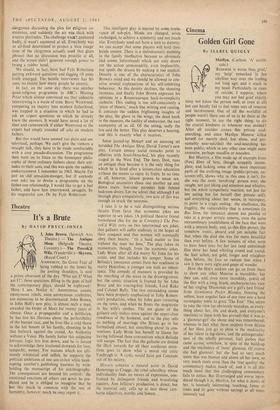Theatre
It's a Brute
By DAVID PRYCE-JONES
I, John Brown. (Ipswich Arts Theatre.) — The Antique Shop. (Belgrade Theatre, Coventry.) -- The Provok'd Wife. (Vaudeville.)—Skyvers.
1 (Royal Court.) ANONYMITY, the Great Pear of being rubbed to the bones by - the jostling shoulders, is now a prime obsession of the day. 'Who am I? What am I?'; those questions, filling in the gaps of half the contemporary plays, should be rephrased: 'Here I am. Notice it.' Anonymous causes, anonymous rebels, soon anonymous celebrities, too numerous to be discriminated. John Brown, in John Hall's new play, is almost such a man, awarded the Order of Merit for twenty years of silence. Once a propagandist and a politician, he has lost his illusions about the perfectibility of the human race, and he lives like a cold thorn in the hot bosom of his family, choosing to be that bulwark against the crow,d, An Authority without a Voice. His family batter this solipsistic fortress; logic lets him down, and he is forced to acknowledge their irrational demands for love, sympathy, money. For reasons which are ulti- mately whimsical and selfish, he supports the political ambitions of one son-in-law while bank- rupting another's publishing business by with- holding the manuscript of his autobiography. The consequences are beyond his control: the emotional reactions of others can never be pre- dicted and he is obliged to recognise that he has this much in common with the rest of humanity, however much he may regret it. This intelligent play is marred by some irrele- vance of sub-plot. Minds are changed, wives exchanged, to achieve a symmetry and not much else. Everybody need not have a turn as dummy; we can accept that some players will hold their hands unseen. There is a melodramatic stabbing in the family (ineffective because so obviously laid scenes beforehand) which not only draws out the action unnecessarily, even implausibly, but spoils the drama by making it too explicit. Density is one of the characteristics of John Brown's mind and we should be allowed to con- ceive several explanations of his self-inhibiting behaviour. As this den§ity declines, the shouting increases, and finally John Brown expresses his opinions in a Rousseauesque back-to-simplicity outburst. This ending is too self-consciously a 'piece of theatre,' much fine writing and ranting. It conceals the sudden frightening insights of the play, the ghost in the wings, the dead book in the museum, the futility of endeavour, the vast anonymity of us all. Of the acting, sadly the less said the better. This play deserves a hearing, and this is exactly what it receives.
Some jazzed-up Mozart and an amusing set heralded The Antique Shop, David Turner's new play. Certain uneasy social remarks point to affinities with Semi-Detached, his play recently staged in the West End. The hero, Don, runs an antique shop because it is the only thing for which he is fitted after a leisure-class education without the means to enjoy its fruits. In no time at all, however, leisure proves to mean sex. Biological necessities chase one another up and down stairs: low-tone parodies hide behind bedroom doors. Let me admit that although I sit through plays compulsively, two acts of this was enough to crack the neurosis.
I take it to be a rule distinguishing serious theatre from farce that economic jokes are superior to sex jokes. (A political theorist friend formulated this for me at Coventry.) The Pro- vok'd Wife rests on two intertwined sex jokes, that gallants will suffer endlessly in the hopes of their conquest and that women will eventually obey their hearts: ''tis a hard matter to live without the man we love.' The play takes its momentum, though, from the economic jokes. Lady Brute after all did marry Sir John for his estate, and that includes his temper. Some of Belinda's innocence conies from her readiness to marry Heartfree, a younger son with no inheri- tance. The comedy of manners is provided by the matching of the sexes in the drawing-room, but the comic situation is framed by Sir John Brute and his roaring-boy friends, Lord Rake and Colonel Bully. The two outstanding scenes have been properly emphasised in Toby Robert- son's production, when Sir John goes roistering on the town, and when he flouts the magistrate in his wife's clothes. The sex game of the gallants only makes sense against the upper-class rowdiness of the husband, and so the play tells us nothing of marriage (the Brutes go in for formalised abuse), but something about its con- ventions. Lady Brute has herself to blame for having followed these conventions which Belinda will escape. The fact that the gallants are denied the illicit rewards for all their assiduous atten- tions goes to show what a moral old critic Vanbrugh is. A cynic would have put Constant out of his misery.
Skyvers contains a natural actor in David Hemmings as Cragge, the rebel schoolboy whose individuality finds no means of expression, con- fronted by delinquent friends and brutalising masters. Ann Jellicoe's production is direct, but the material only calls up at best those cart- horse adjectis worths and honest.






























 Previous page
Previous page